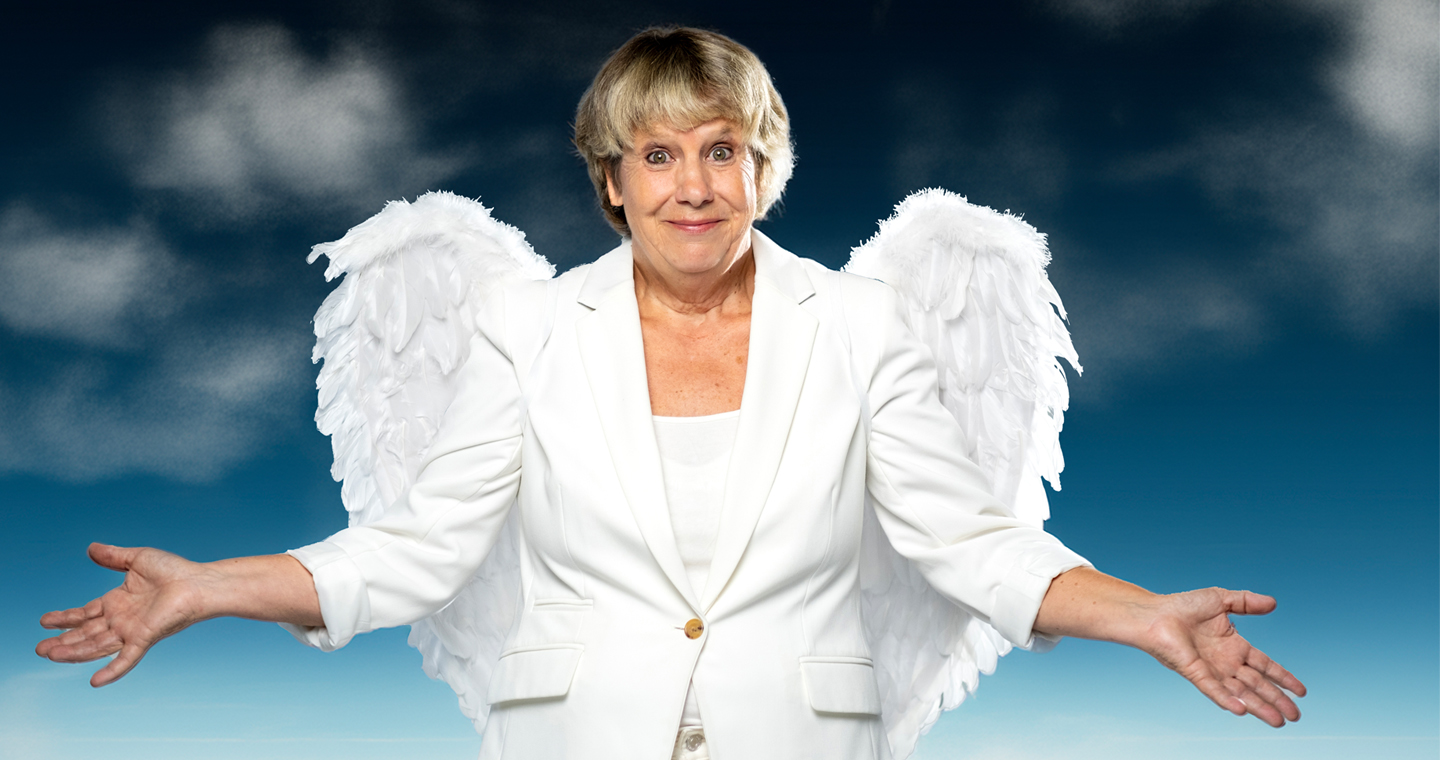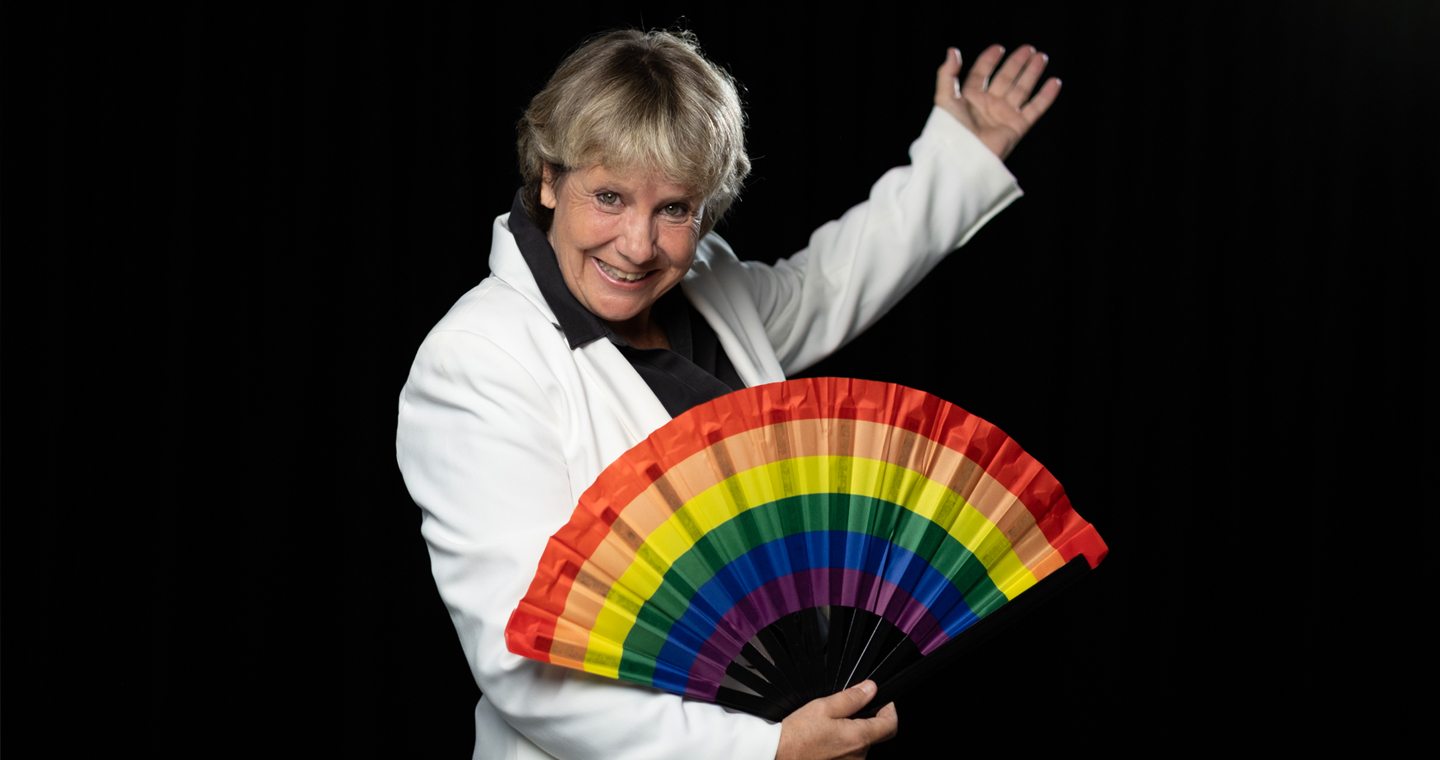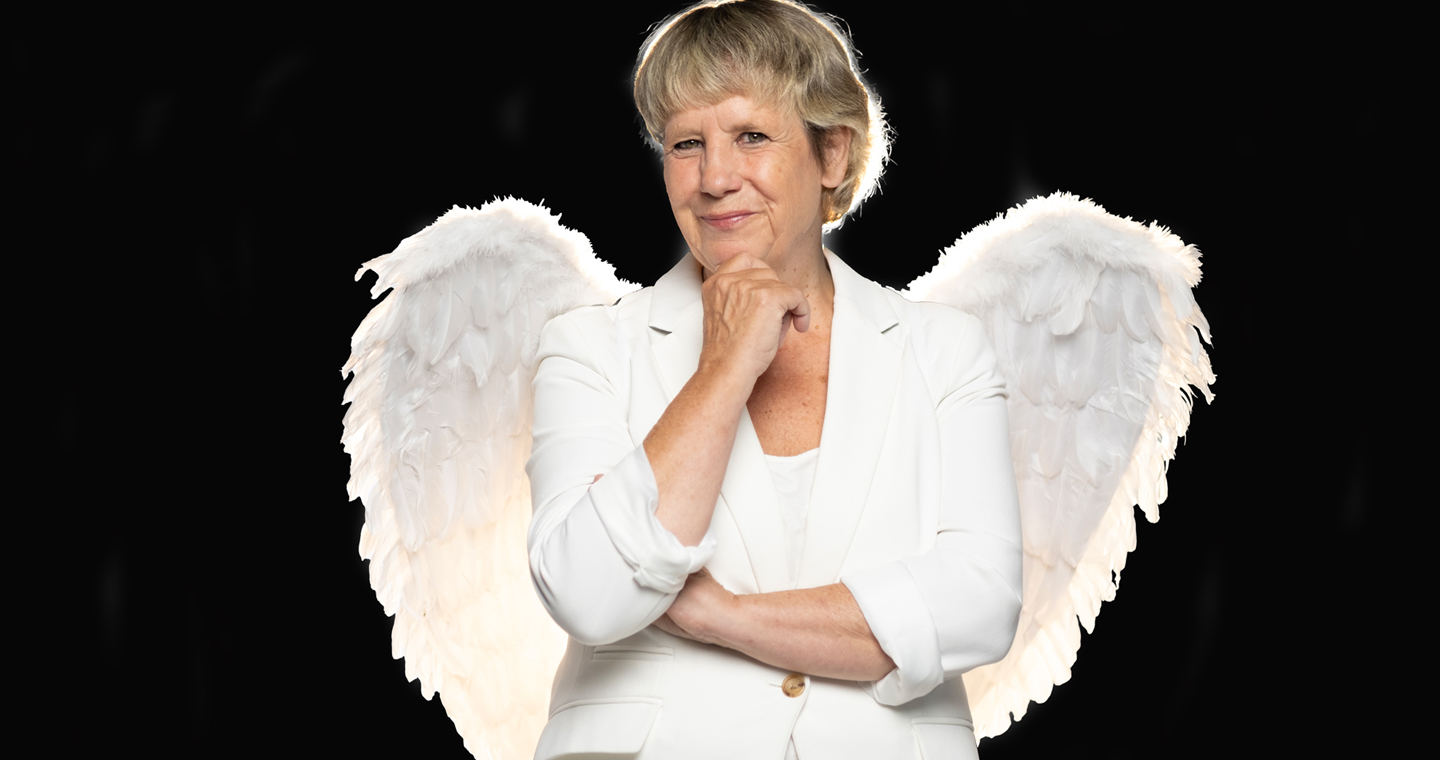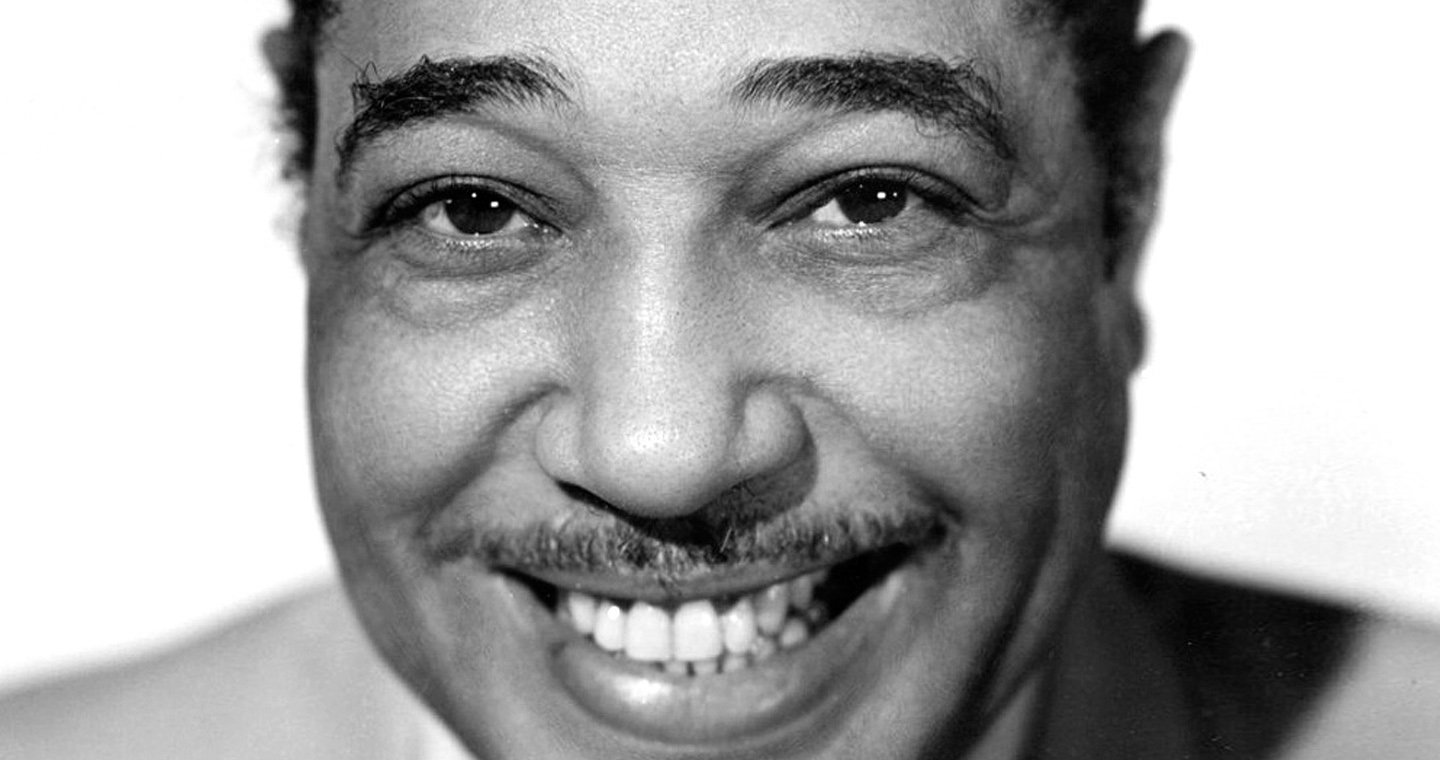In a brand-new one-woman show, Clare Summerskill attempts to explain the point of the perplexing sexual minority to which she belongs. On the way, she asks why lesbians exist? Is it to ease the pressure on cat rescue centres? Is it to ensure that Shibden Hall remains a viable tourist attraction? Or is it to write one-woman comedy shows featuring songs, standup and storytelling? After decades of field research, she thinks she has the answer.
Packed with silliness, satire and self-deprecation, this crowd-pleasing performer is taking this brand-new show out on tour, sharing the previously unheard story of the lesbian squirrel on the Ark, forced to take up a complaint about compulsory heterosexuality with Noah himself; and she will finally uncover the Almighty’s real opinion about women-loving-women.
As this multi-talented stand-up and theatre-maker brings her tour to Brighton’s Komedia on Sun 7 Dec, we got her to tell us more about her craft.
What were the inspirations behind your show, Why God Created Lesbians!? We hope it’s not because you feel a need to justify anything.
The show uses humour, storytelling and songs to look at the many ways in which lesbian lives differ from those of straight people. I’ve noticed that we often try to tell heterosexuals that “we’re just like you – deep down, we’re all the same”, and we often do this to be accepted and to try and reduce any prejudice that might come our way but, in this piece, I address and celebrate the unique ways in which lesbians live and love in a heteronormative world.
Obviously, the show is there to entertain, but do you think performance can nudge attitudes in a wider conversation?
In my one-woman comedy shows, and also with my theatre company’s (Artemis) productions, I have always written plays that address issues relating to the experiences of people from marginalised communities. Most of these have been based on the lives of LGBTQ+ people. So yes, they are created with the intention of bringing our own community together in solidarity and also educating those who were not previously aware of certain issues LGBTQ+ people face.

Did you put a lot of research into this show, or is it all coming from personal experience?
This show was written largely from my own (rather lengthy now!) experience of being a lesbian. But it also draws on some research to do with why lesbians are seen to behave in certain ways – falling in love (or lust) so very quickly and so very hard; staying best friends with our exes; loving cats (or at least pretending to otherwise we wouldn’t be able to get a girlfriend!); lesbians moving in with each other after the first date, and so on. There is also a section which looks at the difference between lesbian jokes and feminist jokes. So, partly based on research but mainly based on observation.
What were your influences when you started performing?
I was a jobbing actress (community theatre companies and West End shows) for many years before I turned to doing stand up and one-woman stage shows but, since my university years, I had always performed cabaret alongside the acting work. At that time, it was ‘feminist-themed’ cabaret, but then I performed in a lesbian double act for many years with Alice Arnold (of Radio 4 presenter and Celebrity Gogglebox fame!). In the late 1980s and 1990s there were hardly any other lesbians performing gay material so, in a way, our work then was quite pioneering.
Performer-wise, my first idol was (this is one for the oldies) Joyce Grenfell, who I saw presenting comedy songs and monologues, and I was drawn to her and this type of show. I also loved the early work of Lily Tomlin who wrote and performed comedy characters, and in later years, Victoria Wood was obviously a huge influence on me, again, because her act combined stand up with songs.
Is there much crossover between dramatic acting and stand-up techniques? Obviously, the latter form allows you to interact with the audience a bit more (unless it’s panto).
Most of the more serious plays that I’ve written are what are termed ‘verbatim theatre’ plays, which means that they are based entirely on interviews with people about a particular event or shared experience.
Frequently, a large amount of the script in a verbatim theatre piece will consist of actors speaking ‘out’ to the audience (think Shakespeare or Renaissance play monologues), rather than actors always talking to each other on stage. In my view, this acting technique is therefore quite closely related to stand up, since the performer is talking directly to audience members and breaking the traditional ‘fourth wall’ of theatre. Whenever I audition someone to perform in one of my plays, if I find out that they have done stand up or cabaret work, I think there is a very good chance they will adapt easily to acting in a verbatim theatre piece.

What advice would you give to someone trying to find their own voice as a writer and performer?
The wonderful thing about stand up and one-person shows (whether they are comedic or serious) is that the audience get to hear about the lives of those who have had different experiences from their own. On the stand up circuit, this means that performers can create material in their own ‘voice’ and present it in their own chosen style.
There can be as many comics are there are people, in contrast to the theatre world, where actors have to wait to be ‘cast’ as a particular character in a script. So, all you have to do to find your voice as a performer is have the courage to tell your own stories in a way that is hopefully interesting and/or humorous.
But there are also many techniques to learn as far as writing and presentation, so be prepared to put the work in when it comes to this. Maybe take a few comedy writing or stand up classes. Book yourself some 5 mins spots, if you can, at a comedy evening. Go home and examine how your set went, noting at which exact points did people laugh? Do you need to change certain wording to make the joke funnier? Do you need to build up your confidence or work on your ‘persona’ when performing in public? And then slowly increase the amount of material you feel able to present on stage. Don’t give up if you think you have something to say because if it’s based on personal experience, there will be no one else out there who has the same stories to tell!
You’re also an established playwright. Are you developing anything at the moment?
With members of my theatre company, I’m currently taking a verbatim play that I’ve written around the country called At the Rainbow’s End. It is based entirely on interviews with older LGBT people about their experiences of homophobia and transphobia while receiving ‘care’ either in their own homes or in residential homes or retirement communities. Very heavy and disturbing stuff, I know, but I feel it’s important to raise awareness and create further discussion about an issue which impacts older members of our community. The piece highlights the fact that many of us are terrified about accessing care when we might need it in later life, or even feel that – after having perhaps lived our whole adult lives as ‘out’ LGBTQ+ people – we might have to consider the possibility of going ‘back into the closet’ for our own safety.
Clare Summerskill brings Why God Created Lesbians to Brighton’s Komedia Studio on Sun 7 Dec 2025.

Mark O'Donnell
Featured What's On
Stay in the loop
Keep up to date with latest news, guides and events with the SALT newsletter.






